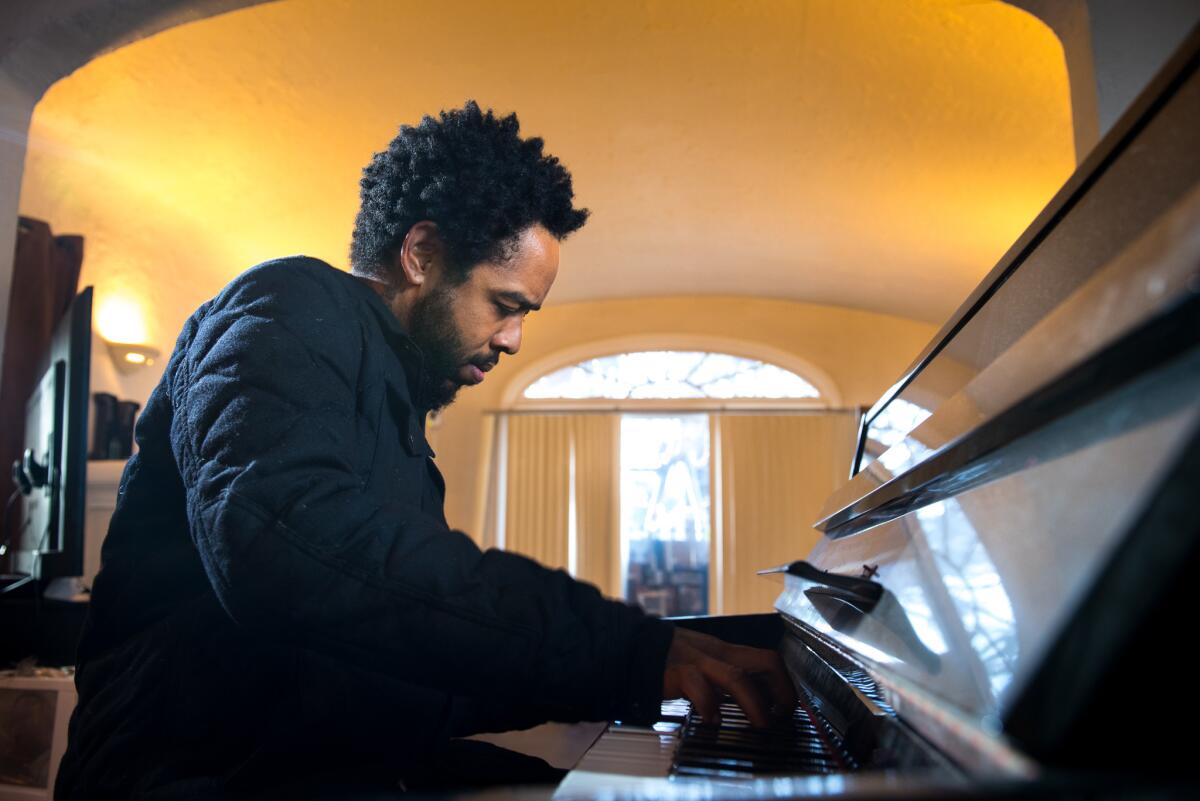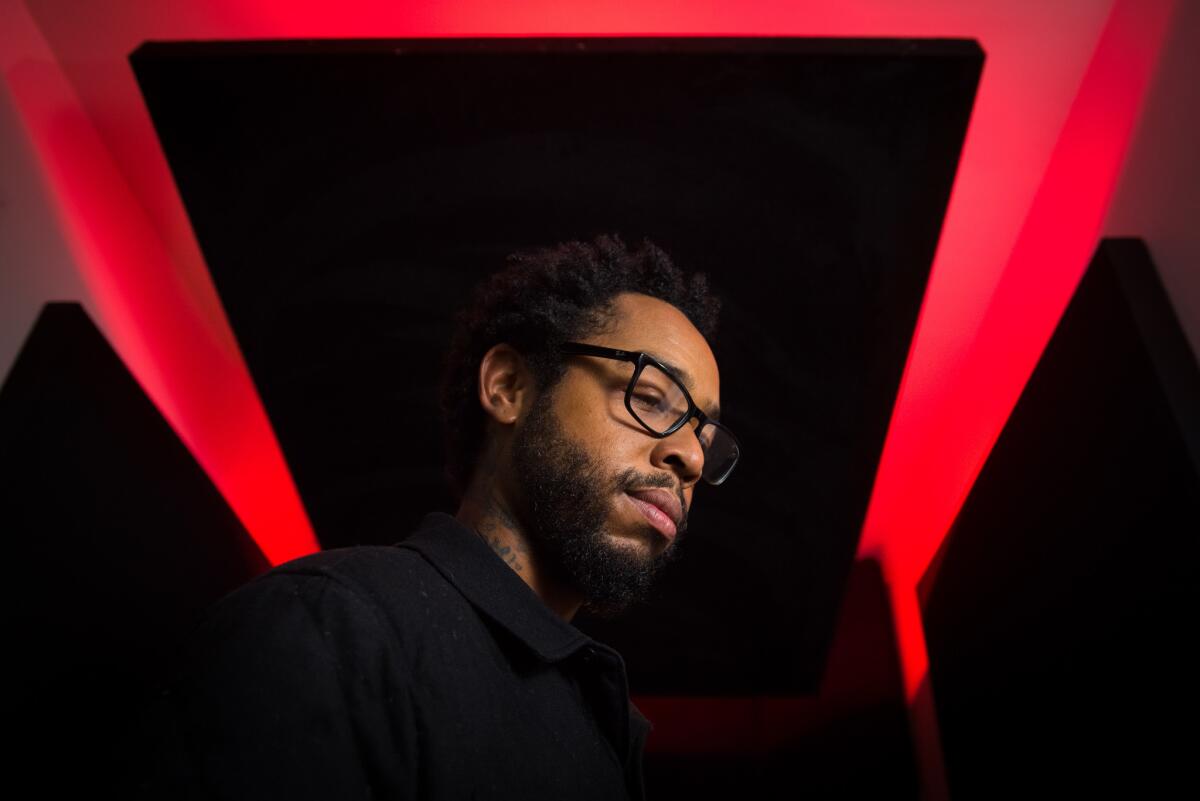Grammy-nominated Terrace Martin’s resume is a who’s who of L.A. hip-hop, jazz and R&B

- Share via
Kendrick Lamar. Snoop Dogg. Kamasi Washington. Robert Glasper. The hip-hop giants and jazz greats all have at least one connecting thread: Terrace Martin.
Come Sunday, Martin will receive his Grammy close-up, as his “Velvet Portraits” is competing for top R&B album. But perhaps R&B is too narrow of a definition for Martin’s music.
Last week at the West Los Angeles Sound Studios, the multi-instrumentalist, producer, composer and local connector was leading a quintet of players through tracks from the work.
Ace musicians who have worked with such artists as Snoop Dogg, Washington, Thundercat, Lamar and more, the pickup band was burning through the song “Curly Martin,” named for Martin’s drum-playing dad.
During a break, Martin, 38, casually asks drummer Garrison Brown whether his friends might like the music they were making, which effortlessly touches on jazz, soul, hip-hop, rhythm & blues until such distinctions are rendered moot.
“My friends? This is over their heads,” Brown replies, and the room erupts with laughter.
Anyone who’s followed Martin’s wild ride knows he’s not on a commercial tip alongside Rihanna or the Weeknd or interested in simple loops and melodies.
“I never really have a theme on what I want any album to sound like because I’m not just one thing, and I don’t like just one thing,” says Martin later. Heavily tattooed, Martin has a musical notation permanently imprinted on his neck and a rosebud decorates the back of his left hand. “I think, ‘Why limit myself? Why limit others?’ All of the records that I’ve been a part of successfully have never been one thing.”
The amazing thing about him is he’s one of a few people that really understands firsthand the music from a hip-hop perspective and from a jazz perspective,
— Keyboardist Robert Glasper on Terrace Martin
As a producer, he’s a longtime collaborator with Grammy-winning rapper Lamar, most recently as a key studio wiz on “To Pimp a Butterfly.”
Martin co-produced the already classic L.A. rap track “King Kunta” and others, and his connections through nearly a quarter-century on the Los Angeles music scene helped fill the record with his longtime peers and collaborators including Washington, Lalah Hathaway, Glasper and others.
“From playing saxophone with God’s Property to playing keys for R. Kelly to playing jazz with Cedar Walton and then producing stuff with Snoop Dogg and Kendrick Lamar — not many people have that kind of resume,” says Glasper, on the phone after a session with Martin and Herbie Hancock.
Across nearly 25 years on the Los Angeles jazz, R&B and hip-hop scene, Martin has shared the stage or the studio with, among others, artists including jazz drummer Billy Higgins, hotshot hip-hop artist-producer Travis Scott and legendary producer Quincy Jones.
In the hip-hop realm, Martin recently produced “Twist My Fingaz,” an underground hit for Compton rapper YG, as well as tracks for Wiz Khalifa, the Game, DJ Quik, Big K.R.I.T and others.
Martin has been signed to Warner Bros. as a rapper-producer, issued a series of mixtapes that featured early verses from Lamar and his Top Dawg label-mate Ab-Soul.
He’s also issued a gorgeous Christmas album, a candlelit rap-and-soul record and, under the moniker 3ChordFold, rap fusion records featuring contributions by artists including Lamar, Ty Dolla Sign and Problem.

The list of his credits could fill the page.
And, as proved by Martin’s moves into a wild alto sax solo during his band’s run-through of “Bromali” during the rehearsal, he could erase the ink off that page with a single burst of his horn. The sextet, which also featured guitarist Marlon Williams, bassist Brandon Eugene Owens, keyboardist Dennis Hamm and Allakoi Peete on percussion, had spent the afternoon prepping for an afternoon set in Baldwin Hills.
“The amazing thing about him is he’s one of a few people that really understands firsthand the music from a hip-hop perspective and from a jazz perspective,” says Glasper. “Most musicians, there’s a weak link on one of those. They don’t quite understand the jazz all the way or they don’t quite understand the hip-hop all the way. But Terrace really, truly understands both sides, and he’s working both sides.”
Glasper and Martin met as teenagers at a prestigious jazz camp in Vail, Colo. By then, Martin had already shown so much promise that comedian Jay Leno had bought him his first professional saxophone and given him a $30,000 scholarship.
I don’t care who says they do all the music alone and everything. Nothing is ever done alone.
— Terrace Martin
Around the same time, celebrated guitarist Williams (Nas, UGK, Jay Z, Snoop, Schoolboy Q) first saw a teenage Martin play during a jam session at the Townhouse in Venice. At the time, he had fire-engine red dreadlocks, says Williams.
“I see this kid get up and I’m like, ‘Whoa, wow. That’s a lot for a kid to play,’ ” says Williams. Martin and Williams are now partners in Sounds of Crenshaw, which issued “Velvet Portraits.”
Soon, Williams was helping Martin get gigs, most notably with Snoop. Recalls Williams of Snoop’s early reaction to Martin’s way around a studio: “At rehearsal, he saw Terrace on the keyboards, saw Terrace on the drums, saw him on the vocoder, saw him on the horn. He said, ‘Cuz is durable. He can do it all.’ Snoop just fell in love with him.”
Martin hasn’t stopped working since, and along the way has become the hub of a community that has set Los Angeles music on a fresh path.
“I believe the only way to produce a real record is at some point to be in that room with that human being so you can feel emotion,” says Martin. “That’s why most of the songs that have changed the world, people have been in the same room together. I don’t care who says they do all the music alone and everything. Nothing is ever done alone.”
Motioning toward the rehearsal stage, Martin points at a bass amplifier in trying to explain what distinguishes his work.
“I still love air,” he says. “Like a woofer: Those speakers only work because of air in the room. If there’s no oxygen, the speakers wouldn’t boom. The air has to breathe.
“So I’m only familiar with things that breathe,” he continues. “Speakers breathe to me. You breathe, I breathe, Marlon breathes, Snoop breathes, Kendrick breathes, Herbie breathes. The drum machines? These things don’t breathe. These things are just tools.”
For tips, records, snapshots and stories on Los Angeles music culture, follow Randall Roberts on Twitter and Instagram: @liledit. Email: [email protected].
ALSO
‘No, take me seriously’: Meet the Regrettes and Cherry Glazerr, L.A.’s new faces of rock
With ‘Bad and Boujee,’ Migos is finally having its moment
Muna, which doesn’t shy away from big topics, is a local band on a mission
More to Read
The biggest entertainment stories
Get our big stories about Hollywood, film, television, music, arts, culture and more right in your inbox as soon as they publish.
You may occasionally receive promotional content from the Los Angeles Times.











